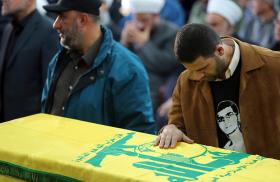In the five years since the September 1993 signing of the Oslo Accords (formally, the Israel-PLO Declaration of Principles), not much peace has been produced. The feeling of hope and optimism among ordinary people has died down.
One issue for Palestinians has been the continuing control by Israel. Despite the fact that nearly all Palestinians live under the jurisdiction of the Palestinian Authority (PA), most place blame for human rights abuses on Israel. This line of thought has prevailed due to the daily pressure Israel puts on the PA to crack down on militants. There is a strong sense in the territories that the issue of Palestinian human rights is being overlooked by both the PA and Israel, if not also by the international community led by the United States.
A symptom of this problem has been the sharp fall-off in meetings between Palestinian human rights activists and Israelis. Before Oslo, even in the worst days of the intifada, there were meetings in Gaza at least once a week between Palestinian human rights activists and Israeli delegations, often large delegations. Now, such meetings are virtually impossible due to the closures. When the two sides meet, it is more likely to be in Europe than at home. Israelis simply cannot make the trip, and it is totally out of the question for Palestinians to go to Israel for such events -- Palestinians cannot even get permission for hospital treatment in Israel except when lucky and after much effort.
Furthermore, the economic and social conditions of Palestinian people have worsened drastically. Today, the living conditions for ordinary Palestinian citizens are no better than they were before the signing of the Oslo Accords. Israel, through its policies and military regulations, controls economic activity in the territories and greatly effects the lives of the Palestinian inhabitants in these areas. As a result, today in Gaza, unemployment is about 60 percent, higher than ever before. The Israeli policy of closure has dashed the Palestinian people's hopes for a lasting peace.
> But another factor has been disappointment in the PA. Instead of trying to advance the cause of human rights, the PA has tolerated many violations. Little progress has been made on such issues as the rule of law, democracy and civil liberties. All sides are now facing different dilemmas, yet Palestinians feel the greatest sense of hopelessness for the future. There is a feeling that the PA has fallen short in championing their cause. The resentment among Palestinians is growing.
Activists like those at the Palestinian Center for Human Rights recognize the handicaps under which the PA works. It only has full jurisdiction over 58% of the Gaza Strip and 3% of the West Bank. And the PA is under great pressure by Israel on many issues, including counter-terrorism, which has the effect of pushing the PA to ignore human rights violations. Nevertheless, the Center is concerned with eight problematic areas vis-a-vis the PA's human rights stance:
Freedom of expression. Restrictions on the freedom of expression, especially of anti-PA and anti-Israel views, are imposed by both the PA and Israel. This situation does not only damage the foundations of democracy, but also seriously hurts any hope for a peaceful future.
Arrests without any due legal procedure. For more than two years, hundreds of Palestinians, especially Hamas members, have been held in prisons without due legal procedure and without being charged with any crime. Even though Palestinian human rights activists tried to challenge this situation, they could not get any concrete result. Any suspicion of possible opposition to the PA or to the occupation results in arrest.
Formation of state security courts. The formation of the state security courts was something very painful for Palestinians. They look too much like the Israeli military courts, which still function in Gaza and the West Bank at the expense of Palestinians.
Lack of independence of the Palestinian judiciary. Neither the PA nor the Israelis respect the decisions of the Palestinian judiciary. Israeli military authorities prevent the courts from dealing with many issues. And habeas corpus decrees of the courts are regularly ignored.
Militarization of Palestinian society. The PA encourages the militarization of the Palestinian society by employing a huge number of security personnel. This impedes the formation of Palestinian civil society.
Freedom of assembly.
Lack of respect for the Palestinian Legislative Council's decisions.
- Corruption and misadministration within the PA.
The human rights and governance problems in the Palestinian areas should be of concern to those who want peace. Palestinian human rights activists believe that the Palestinians' case would be much stronger if the PA acted according to the rule of law. When the human rights and governance situation is bad, people lose faith in the PA, which weakens its ability to move towards peace. Popular dissatisfaction has become a serious issue. Consider the contrast between the high turnout during the election for the Palestinian Legislative Council and what happened recently when registered voters were asked to renew their registration for a special election, held after the resignation from the Council of Haidar Abdel Shafi: out of at least 5,000 registered voters, only 65 showed up.
Real peace necessitates a well-functioning national authority. If the PA continues to permit massive violations of human rights, then peace does not seem achievable in the near future. It is imperative that the groundwork for a Palestinian civil society be laid through building up political and civil institutions.
This Special Policy Forum Report was prepared by Sulay Ozturk.
Policy #168


